Early Settlement Warrens Corners |
| Intro Beaver Dams Ruin Land Forsyth First Settler Wild Animals In Abundance Tavern Erected in 1806 Indian Invasion Repulsed Brave Women Rewarded Romance Named Hamlet Beach Family Arrives The Steadman’s Settle Haner’s Commodious Loghouse The Carleton Family Col. Sutherland Arrives | The First Sawmill Carlton’s First Cidermill Capen and Sabins Arrive The First Physician Arrives Adam’s Blacksmith Shop Mrs. Taylor’s Sudden Death Talbert Opens Tavern Cleared Parker Farm Freer Antecedents Settle Crocker Homestead Built Fowler Traded Farms Samuel Adams Arrives Freeman Builds Sawmill | Tailor in 1819 Beasts Drive Gunn Away First Negro Arrives Physicians were Numerous Cooley Migrated West First School Opened Methodist Church in 1825 Brick Church Built 1858 Military Activities Early School Life Black Famine in 1816 Stage Coach Days Blacksmith Industry | Threshing Machines Harvesting Implements Plows and Harrows One Horse Wagon Boot and Shoe Industry Post Office Manufacturing Roads Cemeteries |
Part 1.
Warrens Corners had no real natural advantages to make it a place of prominence above the many pleasant hamlets that conduce to make up Niagara County one of the most desirable counties of the state to locate in. It chanced to be located near the hub of the county, after its several towns of which it composed were located. Warren’s Corners comprises a part of the towns of Cambria, Lockport, Newfane and Wilson. In 1821 the proper authorities at Albany appointed three commissioners, Erasmus Root, Isaac Hawley and William Bruce, to locate the county seat. In connection with other localities from Lewiston to Wrights Corners they came to Warren’s Corners, and they were royally wined and toasted by Ezra Warren, then a large property holder and hotel keeper of the corners, and offered a commodious site for the location of the public buildings that would necessarily have to be erected.
The proposition was favorable considered by two of the commissioners, but previous to their final decision, Wm. Brittan died, and the remaining two differed in their opinion as to the location, so it became necessary to appoint another commission, which occurred in 1822. When they were qualified, and ready to act in their official capacity the Erie canal had been surveyed and its location determined upon. Therefore they selected Lockport. The wisdom of their choice has made itself manifest as years continue to multiply.
The proposition was favorable considered by two of the commissioners, but previous to their final decision, Wm. Brittan died, and the remaining two differed in their opinion as to the location, so it became necessary to appoint another commission, which occurred in 1822. When they were qualified, and ready to act in their official capacity the Erie canal had been surveyed and its location determined upon. Therefore they selected Lockport. The wisdom of their choice has made itself manifest as years continue to multiply.
Beaver Dams Ruin Land.
The pioneers had a dense forest to confront them as they located on their several farms. Many years previous the beavers had constructed dams to obstruct the flow of water in its natural course, so that three swamps were within, or contiguous to its borders. The one in the north part called, the big bear swamp, embraced hundreds of acres; one south of the Ridge Road, flooded a large tract of land for the most part of the year, and one on the east, located principally on the Forsyth farm, though not as large, retained the water like the previous ones until the hot days of summer, when the malaria that was generated from them caused fevers and augue that enfeebled every member of the community, so that at times hardly enough well ones were left to care for the sick. In time, those dams were opened by state and private ditches from six to eight feet deep. The swamp land was thus reclaimed, and consequently the health of the people in a great measure assured.
Forsyth First Settler.
The first settler that struck a stake for a permanent residence at Warren’s Corners was John Forsyth. He was a native of the State of New Jersey. In the year 1800 he, accompanied by his brother, William, came to Western New York. His brother settled and became a large property holder in Canada near the Falls. He built a large hotel where the Clifton House now stands, and was its proprietor for many years.
John Forsyth sojourned in Genesee County. N. Y., two years. There he became acquainted with and married Miss Mary Ganson, a young lady connected with a family of prominence in that county, many of whom have since help responsible and honored positions in Western New York.
John Forsyth sojourned in Genesee County. N. Y., two years. There he became acquainted with and married Miss Mary Ganson, a young lady connected with a family of prominence in that county, many of whom have since help responsible and honored positions in Western New York.
Wild Animals In Abundance.
Early in the spring of 1805 he with his family started for the Town of Cambria as it as that time comprised all that section of land between Tonawanda Creek and Lake Ontario. His wife and child rode on horse. The household goods and provisions were loaded on an ox sled. Mr. Forsyth drove his stock, which comprised a small flock of sheep, a cow, and some shoats, in connection with the ox team. Taking what at that times was called the Niagara and Batavia road, or might be more properly expressed as an Indian trail. On their arrival a temporary abode was constructed. In the fall a more commodious log house was erected near the site of the present homestead. At that date their nearest neighbor east was Samuel B. Moorehouse, who kept a tavern at the place now called Hartland Corners. The intermediate space was known for many ears as the eleven mile woods. Five miles west on the South ridge, Joseph Hewett had located, who soon after sold out to William Howell, and he kept a hotel at that place for many years. On the North ridge there were two or three families by the name of Beach. A few other families were sparsely located in what was then called the Town of Cambria. The first summer of Mr. Forsyth’s residence, having occasion to cut swail grass in the marshes south of the ridge, principally on the Southerland and Longmate farms of today, he was obligated to go to Mr. Hewett’s five miles, to borrow a pair of boots to protect himself from the bite of the rattlesnakes that infested the marshy places in the warm days of July and August. The second year of their abode Mrs. Forsyth laid one of her small children on the floor on an improvised bed to take its usual mid-day nap. As she went to look to its welfare what was her surprise and horror to see a large rattlesnake that had unceremoniously crawled in the open doorway and lay snugly coiled up on the quilt near the child. With a rare presence of mind she quietly stepped out, got an axe and returned and with a sure blow severed the head of the reptile from its body, thus saving the life of her child. The small flock of sheep that Mr. Forsyth brought from Genesee County became the prey of the wolves. If enclosed for protection for the night they would pounce upon them in the day time. The cold winter nights were many times made hideous by their terrific howling. Bears were quite numerous and at times quite aggressive, especially when they got on track of a good shoat, or a patch of green corn, when bruin and the coon were hardly satisfied with an equal share, regardless of the wants of the pioneer and his family.
Tavern Erected in 1806.
Owing to the immigrants and land speculators that came to settle and view the country, the stage lines that where established to accommodate the travel and carry the mail from the eastern to the western part of the state and the heavy teaming required to carry goods and produce from one section to another, induced many of the early settlers to commence tavern keeping. John Forsyth erected the first sign post for a hotel at Warren’s Corners in the spring of 1806. He lived to be its proprietor until June 2, 1812. He died of paralysis, aged 31 years; was buried a few rods south and west of his late home, where since that times many of his kindred have found their last resting place.
Indian Invasion Repulsed.
At his death Mrs. Forsyth was left with four small children to care for and carry on the farm and manage the hotel. The responsibility resting upon her at that time can hardly be estimated at this distant date. War with England was declared within a few days, June 19, 1812. Prospect of an invasion of British soldiers and Indian savages made the feeble ad unprotected settlers apprehensive of danger, perhaps death. The invasion as apprehended occurred the 23d and 24th of December, 1813. The invading forces composed mostly of Indians, advanced as far east as the Howell tavern on the South ridge. Massacre and destruction of all kinds of property followed their march from Lewiston. At Howell’s hotel they were met by a company of Tuscarora Indians who held their allegiance to the United States under John Mount Pleasant as their chief and there repulsed them, causing the invaders to return to Lewiston. The few settlers at Warren’s Corners packed up what things they could take upon their ox sleds and horse’s backs and started for their previous homes east, principally in Genesee, Livingston and Ontario counties, where many of them had relatives living to provide for them in their extreme necessity. The old Niagara and Batavia road was the one the most of them took. Sad indeed would be the rehearsal of the incidents connected with that journey in the cold, bleak days of December. It was not a very Merry Christmas to them. Turner in his history of the Holland land purchase, states that “entire neighborhoods were deserted, hundreds of log cabins were desolate and the signs and sounds of life were mostly and deserted cattle and sheep jovng and bleating, famishing for the lack of fodder, there was none left to deal to them.
Brave Women Rewarded.
Mrs. Forsyth sent two of her children, Edmund and Luther in the forlorn procession to spend the winter with her brother John Ganson, near Batavia. With the other two smaller ones she remained, prepared to start at a moment’s warning in case of necessity. The defeat of the invaders at Howell’s removed the necessity and she remained at her home, while many of those who fled did not return to occupy their deserted homes until the close of the war.
Romance Named Hamlet.
Ezra Warren who enlisted in a company of cavalry in the state of Vermont in 1812, was in connection with the company sent to the Niagara frontier. He with two others of the company were detailed to do duty at the Forsyth tavern as messengers or to intercept stragglers or deserters from the main force stationed near the river. Then, becoming acquainted with Mrs. Forsyth an attachment was formed and as soon as the members of the company were honorably discharged he returned from Vermont and married her. The place derived its name from him. He continued the business of hotel keeping until the year 1825. That year he became converted through the preaching of the Rev. John Copeland, a circuit preacher of the Methodist Episcopal Church. A radical change in his way of life was made manifest by the baptism of the Holy Ghost that had cleansed him from the sins of the world. He could never be convinced that any other baptism was necessary so that he never was admitted in full membership with any church, only as probationer. Soon after his conversion he became a local evangelist and held revival meetings in many of the churches and school houses throughout the county. Many of the older people of the county remember the fervent exortations of Father Warren, as he was usually called. He died Nov. 12 1857, in the 90th year of his age. His wife preceded him and died Feb. 23, 1857, in the 75th year of her age. Ending a life that was more intensely connected with its history than any other person that has favored it with life’s presence. She was the mother of 12 children, ten of whom grew up to man and womanhood, three of whom are still living. Her grand son, Chas. F. Warren, who owns and lives on the homestead, has among the papers pertaining to the estate, an article from the Holland Land Company, signed by Joseph Ellicott, agreeing to convey to John Forsyth a certain tract of land dated February 17, 1808.
0 Comments
Details
FORSYTH-Warren Tavern Museum
Rent the Tavern
Categories
All
1800 And Froze To Death
1852 Map
1860 Map
Animals Over The Falls
Behind The Walls
Captian John Ganson
Come And Get Your Drunken Pigs
DeWitt Clinton Visits Tavern
Early Settlement Of Warren's Corners
Eli Bruce
Ezra Warren Becomes A Temperance Leader
Ezra Warren's Obituary And Life
Fire At The Forsyth
Former Tavern Keeper Gave Name To Warrens Corners
History
Landmark Preservation Needed
Mary And The Invasion Of Lewiston
Mary Forsyth-Warren
Photos
Small Town News
Tavern As County Seat
Tavern Facts
The Underground Railroad
War Of 1812
Warren's Corners 1938-2017
Warren's Store And Grange Hall

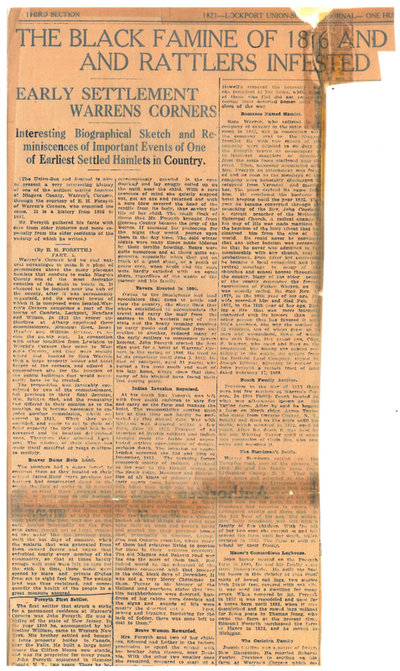

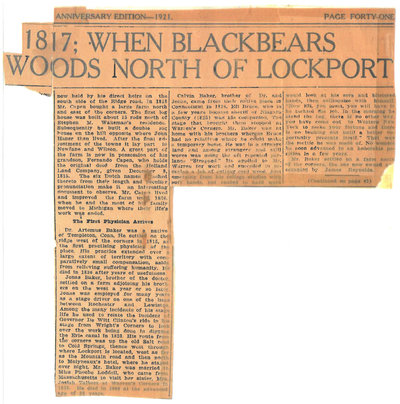
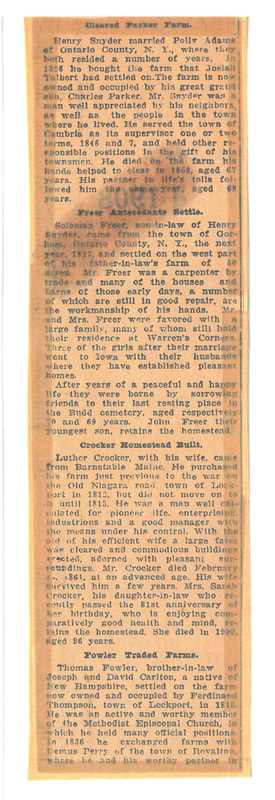
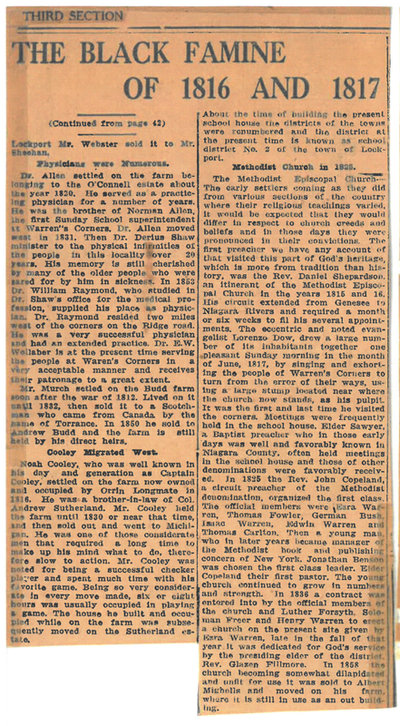
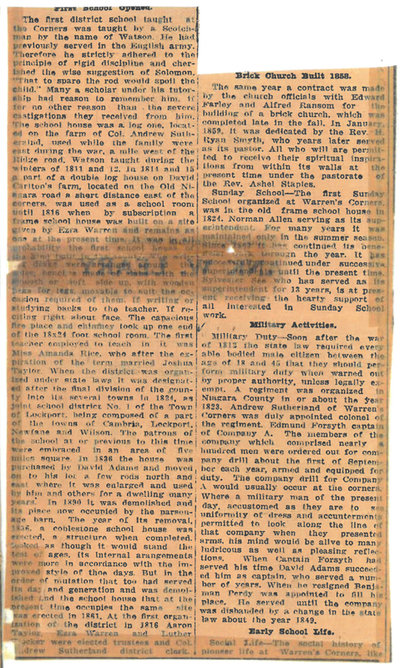
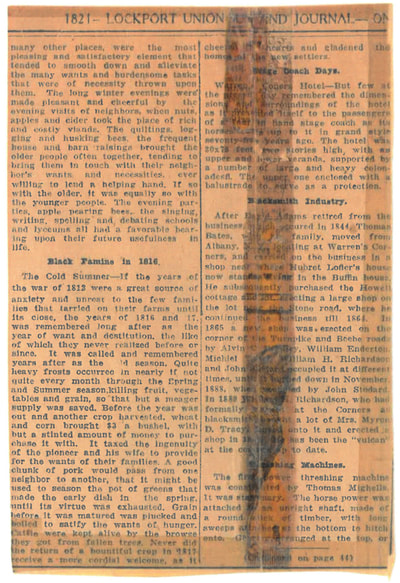
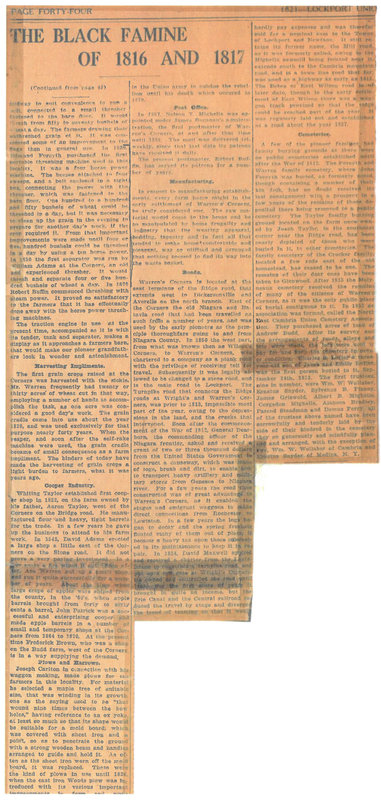
 RSS Feed
RSS Feed






